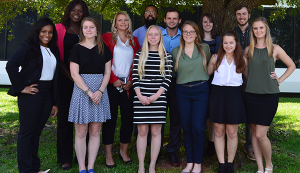SREL welcomes 2016 REU cohort

Aiken, S.C. – The University of Georgia’s Savannah River Ecology Laboratory welcomed 13 undergraduate students to its 2016 cohort this summer to investigate environmental conditions on the U.S. Department of Energy’s Savannah River Site. The students are studying the fate, transport, and effects of radionuclides, or radioactive elements, in the environment.
The students in the 2016 cohort are Sarah Abercrombie, Purdue University; Jill Banach, University of Massachusetts Amherst; Marty Brown, University of South Carolina Upstate; Sheldon Davis, Clemson University; Christian Dicks, Claflin University; Emily Edwards, University of Georgia; Christina Fulghum, University of South Carolina Aiken; Michaela Lambert, University of Kentucky; Brooke Lindell, College of Charleston; Nia Peak, Claflin University; Amelia Russell, University of South Carolina Upstate; Deonte Burston, Fort Valley State University; and Awmna Rana, Florida International University.
SREL’s 10-week summer undergraduate program is a National Science Foundation funded Research Experience for Undergraduates in radioecology. This is the second year of the program.
Dr. Olin E. Rhodes, Jr., director of SREL, said it is a significant feat that an NSF-funded REU program has been reestablished at SREL. “It is particularly noteworthy that SREL’s program is the first and only one in the world to provide this type of experiential training in radioecology at the undergraduate level,” said Rhodes. “As an organization that is recognized both nationally and internationally for its expertise and excellence in the field of radioecology, SREL must take a leadership role in developing the next generation of radioecologists and will continue to provide experiential training at both the undergraduate and graduate levels as long as it has the resources to do so.”
The program gives participants the opportunity to design and execute experiments from hypothesis to analysis, under the mentorship of faculty and research staff from SREL, the University of South Carolina Aiken, and the University of South Carolina Upstate.
